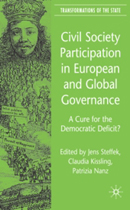|
 In comparison to the democratic nation state, the institutions of European
and global governance clearly suffer from a democratic deficit. Many have
argued that the increased participation of civil society in international
governance may be a cure for this democratic deficit and this collection
investigates whether this argument is supported by empirical evidence. Ten
original essays use comparative research to analyze current patterns of
civil society consultation in thirty-two intergovernmental organizations and
regimes, including the European Union. In particular, chapters examine
problems of access, transparency, responsiveness and inclusion. The study
concludes that civil society consultation holds much promise for rectifying
the democratic deficit but that most institutional arrangements in their
current form fall short of realizing their democratizing potential.
In comparison to the democratic nation state, the institutions of European
and global governance clearly suffer from a democratic deficit. Many have
argued that the increased participation of civil society in international
governance may be a cure for this democratic deficit and this collection
investigates whether this argument is supported by empirical evidence. Ten
original essays use comparative research to analyze current patterns of
civil society consultation in thirty-two intergovernmental organizations and
regimes, including the European Union. In particular, chapters examine
problems of access, transparency, responsiveness and inclusion. The study
concludes that civil society consultation holds much promise for rectifying
the democratic deficit but that most institutional arrangements in their
current form fall short of realizing their democratizing potential.
Download
Flyer and and order form 
Table of Contents 
|
Steffek, Jens (Ed.)
Kissling, Claudia (Ed.)
Nanz, Patrizia (Ed.)
2007
Houndmills, Basingstoke: Palgrave Macmillan
More information
Extern Link 
|